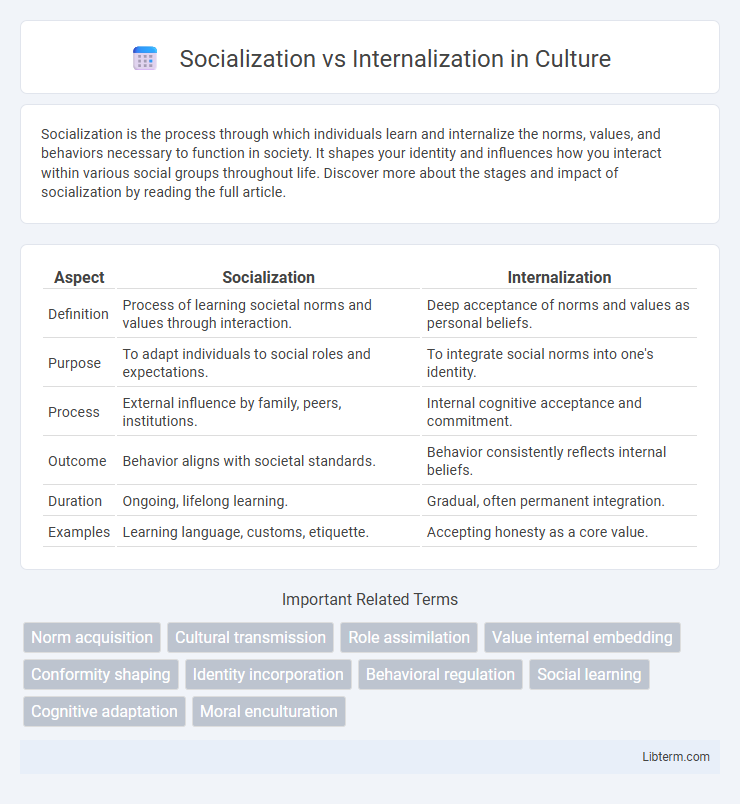Socialization is the process through which individuals learn and internalize the norms, values, and behaviors necessary to function in society. It shapes your identity and influences how you interact within various social groups throughout life. Discover more about the stages and impact of socialization by reading the full article.
Table of Comparison
| Aspect | Socialization | Internalization |
|---|---|---|
| Definition | Process of learning societal norms and values through interaction. | Deep acceptance of norms and values as personal beliefs. |
| Purpose | To adapt individuals to social roles and expectations. | To integrate social norms into one's identity. |
| Process | External influence by family, peers, institutions. | Internal cognitive acceptance and commitment. |
| Outcome | Behavior aligns with societal standards. | Behavior consistently reflects internal beliefs. |
| Duration | Ongoing, lifelong learning. | Gradual, often permanent integration. |
| Examples | Learning language, customs, etiquette. | Accepting honesty as a core value. |
Understanding Socialization: The Basics
Socialization is the process through which individuals learn and adopt the norms, values, behaviors, and social skills necessary to function within a society. It involves interactions with family, peers, educational systems, and media, shaping an individual's social identity and roles. Understanding socialization highlights how cultural transmission occurs across generations, ensuring social cohesion and continuity.
What Is Internalization? Key Definitions
Internalization is the psychological process by which individuals adopt the beliefs, values, and norms of a social group, making them an integral part of their own mindset and behavior. It involves deep cognitive acceptance rather than mere external compliance, leading to authentic alignment with societal expectations. This concept is crucial in understanding how cultural norms are perpetuated through personal identity formation and moral development.
Socialization vs Internalization: Core Differences
Socialization involves the process by which individuals learn and adapt to the norms, values, and behaviors of their society through external influences, while internalization refers to the deep integration of these norms into one's personal belief system, making them intrinsic guides for behavior. The core difference lies in socialization being an external, often gradual learning experience, whereas internalization represents an internal acceptance and personal commitment to those social standards. Socialization shapes behavior through observation and interaction, but internalization transforms that behavior into spontaneous and self-regulated actions aligned with internal values.
Stages of Socialization in Human Development
Socialization in human development involves the process through which individuals acquire cultural norms and social skills essential for effective participation in society. This process occurs in stages, starting with primary socialization during early childhood where family influences dominate, followed by secondary socialization in adolescence as peers, schools, and media shape social roles and identity. Internalization occurs when these external social norms are fully integrated into one's value system, leading to behavior that aligns intrinsically with societal expectations without external enforcement.
The Process of Internalization: How Beliefs Become Personal
Internalization is the psychological process through which socially shared beliefs and norms transform into an individual's personal convictions and values. This process begins with socialization, where external influences such as family, culture, and education introduce norms, but through internalization, these beliefs are integrated deeply into a person's identity and decision-making framework. Neural and cognitive mechanisms reinforce these beliefs over time, making them intrinsic motivations that guide behavior even in the absence of social oversight.
Agents of Socialization: Family, Peers, Media
Agents of socialization such as family, peers, and media play pivotal roles in shaping individual behavior and cultural norms, with family serving as the primary source for early social learning and emotional development. Peers influence socialization by promoting conformity, social skills, and identity exploration during adolescence, while media acts as a powerful agent transmitting societal values, information, and stereotypes on a broad scale. The distinction between socialization and internalization lies in socialization being the process of learning societal roles, whereas internalization involves adopting these roles and values deeply as part of the self-identity.
Factors Influencing Internalization of Values
Factors influencing internalization of values include family environment, cultural norms, and peer interactions, which shape an individual's belief system and identity. Cognitive development and emotional experiences contribute to how deeply values are internalized, affecting long-term behavior and decision-making. Social institutions, such as schools and religious organizations, reinforce these values through consistent modeling and reinforcement.
Socialization's Role in Shaping Identity
Socialization plays a crucial role in shaping identity by transmitting cultural norms, values, and behaviors through family, peers, and educational systems, enabling individuals to develop a sense of self and social belonging. This process involves learning socially accepted roles, language, and customs that influence attitudes and worldview. Over time, socialization reinforces an individual's identity within their community, distinguishing it from internalization, which reflects the deeper acceptance and personal integration of these social norms.
The Impact of Internalization on Behavior
Internalization profoundly shapes behavior by embedding societal norms and values into an individual's core belief system, leading to consistent actions even in the absence of external enforcement. Unlike socialization, which involves learning expected roles and rules, internalization transforms these norms into intrinsic motivations, driving authentic and self-regulated behavior. This process explains why people uphold ethical standards and social responsibilities inherently, reinforcing stability within communities.
Socialization and Internalization: Interconnected Dynamics
Socialization involves the process by which individuals acquire societal norms, values, and behaviors through interaction with family, peers, and institutions, forming the foundation of social identity. Internalization occurs when these external norms are deeply integrated into an individual's belief system, guiding behavior automatically without external enforcement. The interconnected dynamics between socialization and internalization emphasize that socialization provides the essential exposure and context, while internalization ensures these societal elements become an intrinsic part of personal conduct.
Socialization Infographic

 libterm.com
libterm.com